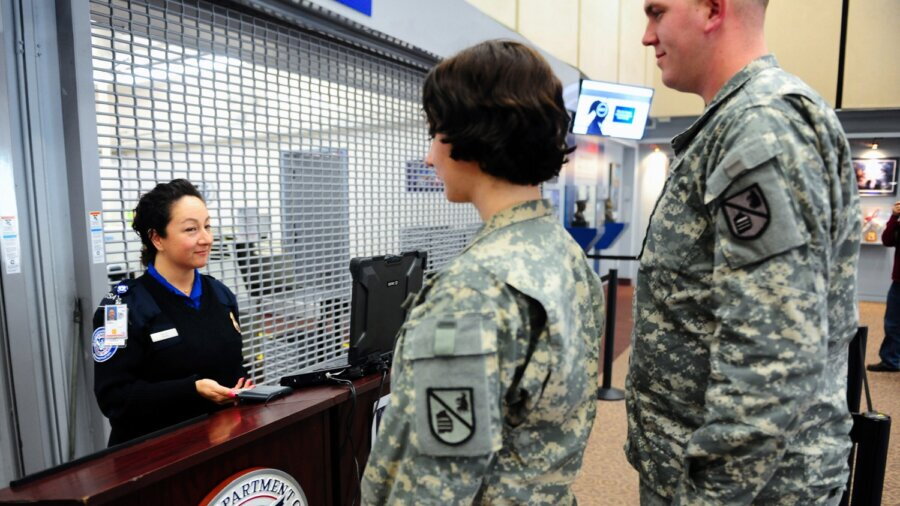Official travel is an essential part of military operations, but it comes with its own set of challenges. Whether you’re traveling for a Permanent Change of Station (PCS), a training mission, or any other duty assignment, disruptions such as severe weather, mechanical failures, staffing shortages, or overbooked flights can throw a wrench in your travel plans. When these disruptions happen, the need for quick action becomes even more critical.
For Department of Defense (DoD) travelers, ensuring that you meet your mission requirements while navigating unforeseen travel disruptions requires preparation and knowledge of travel policies. Long hold times with airlines or Travel Management Companies (TMCs) during peak travel periods can add to the frustration. To help mitigate delays and get you back on track, here are key tips for safeguarding your travel during disruptions.
1. Start with the Defense Travel System (DTS) for All Bookings
One of the easiest ways to avoid delays or confusion with official travel is to use the Defense Travel System (DTS) for all travel bookings, including new reservations, changes, and cancellations. DTS is the DoD’s primary platform for managing official travel, and using it for every part of your journey streamlines the process and reduces the likelihood of mistakes.
- Tip: If you need to make a change in your travel plans, and you can’t do it directly in DTS, send an email to your TMC as soon as possible. Make sure to include your travel start date in the subject line to help prioritize your request.
2. Ensure Your Government Travel Charge Card (GTCC) is Ready
Before booking travel, make sure your Government Travel Charge Card (GTCC) is activated and has a sufficient credit limit. A declined GTCC can cause unnecessary delays and add complexity to your travel arrangements. Agency Program Coordinators (APCs) are your go-to resource for ensuring that your card is activated and ready for use.
- Tip: Collaborate with your organization’s APC to verify your GTCC’s status before booking travel. Defense Travel Administrators (DTAs) should also review the Accounts Info List and Departure Report in DTS to ensure all travel cards are properly activated and have adequate limits.
3. Allow Time for DTS Authorizations and Ticketing
After submitting a DTS authorization, you should allow 24 hours (excluding weekends and holidays) for the request to be processed and ticketed. If you haven’t received confirmation or your request has been stuck in the “CTO Submit” status for over 24 hours, it’s time to reach out to the Travel Assistance Center (TAC).
- Tip: Use TAC Live Chat for the fastest resolution during business hours. This often allows you to avoid long hold times and get assistance in real-time.
4. Confirm Your Seat Assignment ASAP
Once your flight is ticketed and the invoice is issued, don’t wait to confirm your seat assignment. Most airlines allow you to confirm your seat through their app or website using just your last name and airline confirmation number.
- Tip: Confirming your seat assignment right away increases the chances of getting on the flight you booked and decreases the likelihood of being bumped due to overbooking.
5. Sign Up for Loyalty Programs
Airline, hotel, and rental car loyalty programs offer a range of benefits that can be especially useful when your travel plans change unexpectedly. Members of these programs often enjoy priority rebooking, dedicated support lines, free Wi-Fi, and additional seat selection options.
- Tip: Sign up for loyalty programs before you travel. Being a member can provide quicker access to support and services when things go wrong during your official travel.
6. Download Travel Apps for Real-Time Notifications
Airlines, rental car companies, and hotels all offer apps that can provide immediate updates on your bookings, delays, or cancellations. These apps allow you to interact directly with service providers, making it easier to handle disruptions in real-time.
- Tip: Download apps for all services you will use during your travel—airlines, train companies, rental car providers, and hotel chains—to streamline your travel experience and receive timely notifications.
7. Explore Alternative Customer Support Options
If you’re facing long hold times with customer support, look for alternative options such as live chat or email support. Many TMCs and airlines offer online support for handling requests such as trip cancellations, ticket changes, or invoice copies. Avoid using multiple channels to contact different agents, as it can delay responses.
- Tip: Contact your assigned TMC using only one support method, whether it’s email or chat, to avoid complications and faster resolution.
8. Take Control of Rental Car and Hotel Reservations
When travel disruptions occur, especially during flight delays or cancellations, you may need to make changes to your rental car or hotel reservations. If your flight is delayed, it’s often best to reach out to the airline directly to rebook and maintain the government fare. However, when rebooking with the same airline isn’t possible, there are other ways to handle changes.
- Tip: If your travel is disrupted, contact rental car companies and hotels directly to modify your reservation. Rebooking directly with the airline ensures that you maintain the government contract rate.
9. Review Your Travel Disruptions Resources
Before heading out on your trip, make sure you’re familiar with your organization’s travel disruptions page. This resource offers in-depth information on how to handle changes to flights, hotels, car rentals, and other critical aspects of official travel.
- Tip: Familiarize yourself with the resources available to help you navigate disruptions. Having a plan in place can save you time and stress when the unexpected occurs.
Conclusion: Stay Prepared for Smooth Travel
Disruptions during official travel are inevitable, but with the right preparation, you can minimize delays and ensure that you meet your mission requirements. By using the Defense Travel System (DTS), confirming seat assignments, leveraging loyalty programs, and utilizing the latest travel apps, you can better safeguard against common travel hiccups. Additionally, proactive communication with Travel Management Companies (TMCs) and being familiar with your government travel policies will make a significant difference in navigating disruptions efficiently.
At MilitaryTravelPerks.com, we are dedicated to supporting military travelers by providing valuable travel insights, resources, and solutions to help you make the most of your travel experience. Whether you’re traveling for a PCS move, a training mission, or any other duty-related trip, the right tools and strategies can help you get back on track quickly.





You must log in to post a comment. Log in now.